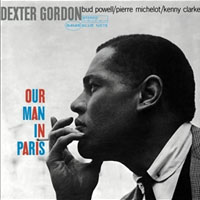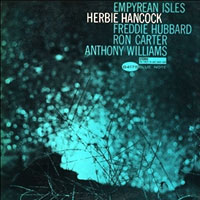Dexter Gordon • Our Man in Paris
Herbie Hancock • Empyrean Isles
y first impression after opening the LP mailers from Music Matters was one of awe. Over the years I have seen many reissues sporting greatly improved graphics and care in production. However, the two LPs I was now holding in my hands hit the very highest standards. The heavy laminated gatefold jackets shone with the Francis Wolf/Reid Miles artwork and clear facsimiles of the original liner notes. Inside, original Blue Note B&W session photos added high-resolution eye candy to the presentation. Labels were true to '60s-vintage "New York City, USA" Blue Notes. The only thing missing was the printed inner sleeve that Blue Note used to promote their catalogue of recordings. Music Matters has evolved from a mail-order jazz record dealer to "reissuing some of the finest LP recordings of the famous Blue Note label on vinyl." Critical response to the first releases, cut at 45rpm, was universally positive. For the well-heeled jazz lover, those recordings will most likely never sound better or be presented with more class. The price, and the fact that one had to turn the records over twice to hear the complete session, caused some to hold back. Enter these relatively new Music Matters reissues. The two covered here are the first in a second series of a dozen Blue Notes released at 33 instead of 45rpm. They represent a 30% cost savings and a single flip to hear the entire recording. Sourced from the original three-track stereo master tapes, the LPs are mastered by Kevin Gray at his Cohearent Audio and pressed by RTI on dead-quiet, pancake-flat 180-gram vinyl. On first listen, even on my modest vinyl rig, I could tell something really special was happening. These two records feature two of Blue Note’s stars performing vital modern jazz that came to be recognized as essential listening by most critics. As an expatriate in Europe, Gordon entered CBS’s Paris studios and recorded two albums: Our Man in Paris (1963) and One Flight Up (1964). Our Man in Paris is great mainstream bop served up with a daring twist. If you’re not a Dexter fan yet, this album should convince you to join the club. Following on the heels of his then-recent comeback on Blue Note, this album became one of the landmarks of modern bop recordings. Gordon, an Angeleno standing 6’6" tall, had a career lasting 40 years, toward the end of which he was nominated for an Academy Award for Best Actor and received a Grammy for Best Jazz Instrumental. On Our Man in Paris, he was in the company of The Three Bosses (as fellow ex-patriots pianist Bud Powell and drummer Kenny Clarke, along with Parisian bassist Pierre Michelot were known), laying down two jazz standards, two ballads and an up-tempo swinger. This recording was one of the few Blue Notes not engineered by Rudy Van Gelder, so the usual placement of musicians is different -- drums to the left, piano to the right, sax and bass center. After an audible count off, Dexter comes out of the gate scalding on Charlie Parker’s "Scrapple from the Apple" and attacks the tune as if the end of the world is near. Breaking with the past, Gordon’s style here strikes me as being somewhere between the density of latter-day Coltrane and the frantic pulse of Johnny Griffin. His behind-the-beat phrasing, intensity and sense of abandon created excitement that had me edging forward in my seat to get closer to the music. On "Willow Weep for Me" Gordon is bathed in mild reverb, his sublime solo highlighting his throaty, full-bodied, sometimes brash tone. Though this sound may not be to everyone’s liking (I was indifferent at first but came to appreciate it), I suggest it epitomizes the unique, often undisciplined and forceful nature of jazz. Don’t fret if Powell’s beautiful piano solo, an object lesson in bop, sounds as if there’s mistracking. It’s only Bud vocalizing, which he does enthusiastically throughout the session. The popular swinger "Broadway" features an adventurous solo from Gordon and another great one from Powell, who quotes Basie as the song ends. "Stairway to the Stars" defines the effect of close miking, capturing the fullest, throatiest tenor-sax sound and piano-string resonance heard so far. The album closer, Dizzy Gillespie’s "Night In Tunisia," catches fire and features a Dexter Gordon take-no-prisoners solo that should be required listening for every student of jazz saxophone. Powell, as usual, is great and Clarke, not wanting to be outdone, lets loose explosive volleys of drum pyrotechnics captured (fortunately) in magnificent sound. I haven’t mentioned it yet, but Pierre Michelot’s bass provides a firm and consistent foundation for the others to play over. Herbie Hancock had it all together in the mid-'60s, just as he does now. His diverse musical endeavors earned him over a dozen Grammys and a 1986 Academy Award for Original Music Score for the soundtrack to ‘Round Midnight, a film in which he acted and performed with Dexter Gordon. Empyrean Isles features his quartet of Freddie Hubbard on cornet, drummer Tony Williams and Ron Carter on bass. More exciting and challenging post-bop jazz you are unlikely to hear. The record conveys with striking clarity and holographic certainty Rody Van Gelder’s early-'60s setup, with horns left, piano center and bass and drums right. The sound is so eerily present that I felt I was in the Frank Lloyd Wright-inspired studio with the musicians. The album remains one of Hancock’s most adventurous undertakings and spawned a hit of sorts with "Cantaloupe Island." If any jazz tune from the '60s was to become a crossover hit, it would be this one, a Hancock original. It has it all: a catchy tune, rousing solos, infectious rhythms, and, unfortunately, a good bit of reverb, which adds only a glaze to the otherwise outstanding recording. If you’re a jazz lover, you’ve heard this song before, perhaps many times. "One Finger Snap" features Hubbard coming out of the gate and soaring through the changes in this Hancock original. An up-tempo swinger, it sets the tone for the rest of the album, described in the liner notes as ". . . a quartet album for trumpet and rhythm section." The song ends with an explosive Williams drum solo. "Oliloqui Valley" presents an enchanting melody signaling the new sound of jazz in the '60s. Pushed along over an insistent drum/bass foundation, Hancock’s solo is chock-full of modern block chords and new harmonies. Hubbard again just about steals the show with his heroic solo. Listening to him here, it’s no wonder he became a jazz superstar. "The Egg," the album’s closer, gives a glimpse into the dilemma of modern jazz: how do you keep interest while trying new ideas? It’s not a tune you can tap your feet to. Instead, it sounds far ahead of its time, seeming more suited to the concert hall than a nightclub. When first heard in 1964, it had my buds and me looking at each other, shaking our heads in disbelief, trying to come to grips with what we were hearing. There you have it -- two albums of essential modern jazz,
one an update on the bop tradition, the other a departure into jazz’s newer wave.
Both belong in any collection. As a bonus, it’s unlikely they will ever look or sound
any better. |



